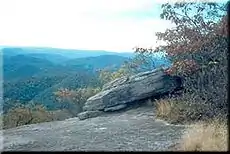Blood Mountain
Blood Mountain is the highest peak on the Georgia section of the Appalachian Trail and the sixth-tallest mountain in Georgia, with an elevation of 4,458 feet (1,359 m).[1][3] It is located on the border of Lumpkin County with Union County and is within the boundaries of the Chattahoochee National Forest and the Blood Mountain Wilderness. There are several waterfalls, hiking trails and other recreational areas in the vicinity.
| Blood Mountain | |
|---|---|
 Blood Mountain, as seen from Vogel State Park | |
| Highest point | |
| Elevation | 4,458 ft (1,359 m) [1] |
| Listing | Mountains of Georgia |
| Coordinates | 34°44′23″N 83°56′14″W [2] |
| Geography | |
 Blood Mountain | |
| Parent range | Blue Ridge Mountains |
| Topo map | USGS Neel Gap[2] |
| Climbing | |
| First ascent | unknown |
| Easiest route | Appalachian Trail, other trails |
Blood Mountain is the high point of the Apalachicola River watershed via the Chattahoochee River, making the mountain the highest point of any land draining ultimately to the state of Florida.
History
There are various theories on the origin of the mountain's name. Some believe that the name of the mountain comes from a bloody battle between the Cherokee and Creek Indians.[4] Some people believe that it got its name from the reddish color of the lichen and Catawba growing near the summit.[3]
The mountain drew media attention in January 2008 when 24-year-old hiker Meredith Emerson went missing from a nearby trail. Her body was later recovered some distance away.[5] Authorities arrested Gary Hilton on charges of murdering Emerson.[6] On January 31 Hilton pleaded guilty and was sentenced to life in prison.[7]
Hiking and recreation

This peak has scenic views from the large rock formations that top the mountain. There is a hiker's shelter at the top of the mountain maintained by the Georgia Appalachian Trail Club, and at the bottom of the eastern side of the mountain is a hostel and store (at Neel Gap, where the Appalachian Trail intersects U.S. Highway 19/129) at the Walasi-Yi Interpretive Center. The summit shelter is a two-room stone cabin which was built by the Civilian Conservation Corps in 1934 and was listed on the National Register of Historic Places in January 2013.[8] The Walasi-Yi Center started out as log cabin constructed in the early 20th century by a logging company. It was renovated and expanded by the Civilian Conservation Corps in 1933-38 into a larger stone building.[9] The Center now houses a store; its breezeway is the only place the Appalachian Trail passes through a man-made structure.[9]

There is a short (2 mile) but steep (1,800 foot elevation gain) approach trail to the top of the mountain from a parking area to the immediate north of the Walasi-Yi Center. This hike includes views as walkers approach the summit, and the final 1.5 miles (2.4 km), past the Flatrock Gap intersection with the Byron Reece Trail, has a number of switchbacks. It is perhaps the most hiked segment of the Appalachian Trail in Georgia.[10] Another approach is from the other side at Lake Winfield Scott via the Slaughter Creek Trail. This approach, which is easier to hike, has campsites and a number of sources of treatable water.
Adjacent to the mountain are several boulder fields and stands of northern hardwoods and large buckeyes. Portions of the area were previously logged and now sport fast-growing tulip poplar.
Near Blood Mountain are DeSoto Falls Scenic Recreation Area and campground, Vogel State Park and Sosebee Cove Scenic Area. All are accessible from Blood Mountain by trail and road.
References
- Brown, Fred (1996). The Georgia Conservancy's Guide to The North Georgia Mountains (3rd ed.). Atlanta: Longstreet Press. ISBN 1-56352-314-0.
- Tucker, Margaret. "A Winter Hike on Blood Mountain." Reprinted in Brown's Guide to the Georgia Outdoors, John W. English, ed. Atlanta: 1986, Cherokee Publishing. ISBN 0-87797-128-5
- Georgia's Named Summits
- 100 highest peaks in Georgia
- Georgia peaks over 4,000 feet (1,200 m)
Notes
- Prats, J.J., ed. (2007-11-01). "Blood Mountain". The Historical Marker Database. Retrieved 2008-01-09.
- "Blood Mountain". Geographic Names Information System. United States Geological Survey. Retrieved 2021-02-07.
- Brown (1996), p.93
- Perry, Tristan. Ghostly Legends of the Appalachian Trail. Wever, Iowa: Quixote Press, 2008. Pages 63-76.
- The Associated Press (2008-01-07). "Drifter Leads Officials To Hiker's Body". Fox News. Retrieved 2021-02-07.
- Boone, Christian (2004-01-31). "Hilton 'prime suspect' in Fla. woman's death". AJC.com. The Atlanta Journal-Constitution. Archived from the original on 2012-03-19. Retrieved 2008-01-11.
- "Hilton pleads guilty, gets life for killing hiker". CNN. 2008-01-31. Retrieved 2008-01-31.
- "Weekly list of actions taken on properties: 1/07/13 through 1/11/13". National Park Service. January 7, 2013. Retrieved February 16, 2013.
- Brown (1996), p. 94
- Brown (1996), pp. 93-94.
External links
| Wikimedia Commons has media related to Blood Mountain. |